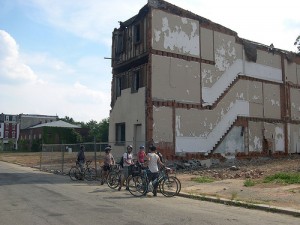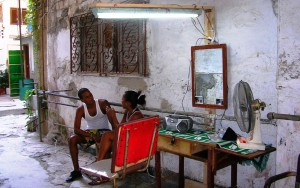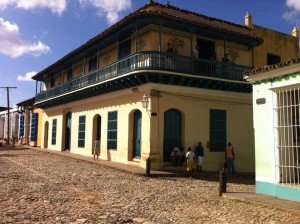 CUBA: NUEVAS OPCIONES PARA CONSTRUIR EN AZOTEAS Y SOLARES.
CUBA: NUEVAS OPCIONES PARA CONSTRUIR EN AZOTEAS Y SOLARES.
El gobierno cubano anunció un grupo de medidas para reestructurar el actual sistema de la vivienda en el país y ampliar las opciones constructivas de la población en azoteas, solares yermos y terrenos estatales.
La Gaceta Oficial Extraordinaria No. 40, publicada el pasado viernes, dio a conocer el Decreto-Ley 322/2014 del Consejo de Estado, que introduce modificaciones sustanciales a la Ley General de la Vivienda, vigente desde 1988, y busca simplificar normativas legales en los trámites de la ciudadanía a la hora de gestionar permutas, traspaso de propiedades y peticiones de construcción por cuenta propia.
La legislación, firmada por el gobernante Raúl Castro el pasado 31 de julio, se propone “perfeccionar la atención estatal a los asuntos de la vivienda y reorganizar las actividades relacionadas con esta, reasignándola a organismos relacionados con las funciones que hasta el momento rectoraba el Instituto Nacional de la Vivienda [INV]“.
Control para Planificación Física
De hecho, el perfeccionamiento implicará el traspaso de las principales funciones del INV al Instituto de Planificación Física (IPF), presidido por el General Samuel Rodiles Planas, así como otros organismos estatales como los ministerios de Construcción, Justicia y Trabajo y Seguridad Social, y el sistema de Tribunales Populares Provinciales y Municipales.
Con esta decisión gubernamental, el INV pasa a ser una Dirección General del Ministerio de la Construcción, con la misión de dirigir, ejecutar y controlar la política del Estado y el Gobierno en cuanto a la vivienda.
La Gaceta Oficial publicó además otras siete resoluciones complementarias al Decreto-Ley 322/2014, las cuales están dirigidas a agilizar trámites y permisos de la población, fortalecer el ordenamiento territorial y urbano, y combatir las violaciones y construcciones ilegales.
El paquete de medidas entrará en vigor el 5 de enero del 2015.
Entre las funciones que asume el IPF están la asignación de terrenos estatales a personas naturales o jurídicas que los soliciten para construir viviendas, la certificación de habitabilidad de las viviendas terminadas, la aprobación de los procedimientos de los dictámenes técnicos para la tasación de los inmuebles y el traspaso de solares yermos y azoteas.
Las nuevas disposiciones regularán la compraventa, donación y permuta con el Estado de solares yermos.
El IPF podrá asignar terrenos estatales a personas necesitadas para la construcción de viviendas por esfuerzo propio. El terreno entregado deberá contar con las condiciones de urbanización primarias para que pueda comenzar a construirse de inmediato.
Para la entrega de terrenos y solares se priorizarán los afectados por desastres, personas necesitadas de erradicar condiciones de precariedad, casos sociales y albergados, y los ubicados en zonas de riesgo por peligro sísmico o catástrofes naturales.
Asimismo se flexibilizará la cesión y uso de azoteas para la ampliación de viviendas, sea por vía de pago o no.
CafeFuerte/InternetPhotos/www.thecubanhistory.com
The Cuban History, Hollywood.
Arnoldo Varona, Editor.
CUBA: NEW OPTIONS TO BUILD ON ROOFTOPS AND VACANT LOTS..
The Cuban government announced a series of measures to restructure the current system of housing in the country and expanding population constructive options on rooftops, vacant lots and state land.
The Official Gazette No. 40, published last Friday, announced the Decree-Law 322/2014 of the Council of State, which introduces substantial modifications to the General Housing Act, in force since 1988 and seeks to simplify statutory regulations formalities of citizenship in managing exchanges, transfer of property and construction requests on their own.
The legislation, signed by President Raul Castro on July 31, aims to “improve the state attention to issues of housing and reorganizing the activities related to this, reasignándola related to the functions so far rectoraba agencies Institute national Housing [INV] “.
Control for Physical Planning
In fact, the development will involve the transfer of the main functions of INV to the Institute of Physical Planning (IPF), chaired by General Samuel Rodiles Planas and other state agencies such as the Ministries of Construction, Justice and Labour and Social Security, and the system of provincial and municipal People’s Courts.
With this government decision, the INV becomes a Directorate General of the Ministry of Construction, with the mission of directing, executing and controlling the policy of the State and the Government in respect to housing.
The Official Gazette published seven other complementary addition to Decree-Law 322/2014 resolutions, which are designed to streamline paperwork and permits of the population, strengthen the territorial and urban planning, and combat violations and illegal constructions.
The package of measures will take effect on January 5, 2015.
Among the functions assumed by the IPF are the allocation of state land to individuals or companies that request for housing, certification of occupancy of the completed homes, the approval of the expert advice procedures for the appraisal of the property and the transfer of vacant lots and rooftops.
The new provisions governing the sale, donation and exchange with the State of vacant lots.
The IPF may allocate state land to people in need for housing construction by own efforts. The land must have given the conditions of primary urbanization so that you can begin construction immediately.
For delivery of land and plots will prioritize those affected by disasters, people need to eradicate precarious conditions, social cases and housed, and those located in areas at risk for seismic hazard or natural disasters.
The assignment and use of roofs for housing expansion was also more flexible, whether by way of payment or not.
CaféFuerte / InternetPhotos / www.thecubanhistory.com
The Cuban History, Hollywood.
Arnoldo Varona, Editor.



 CUBA: new options to build on rooftops and vacant lots. ** Nuevas opciones para construir en azoteas y solares.
CUBA: new options to build on rooftops and vacant lots. ** Nuevas opciones para construir en azoteas y solares.

